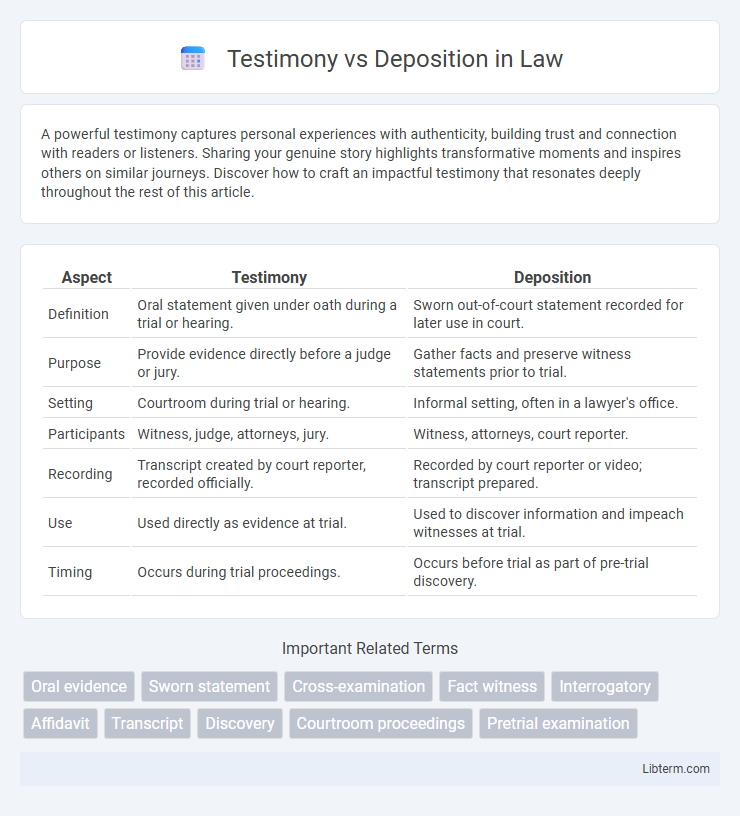A powerful testimony captures personal experiences with authenticity, building trust and connection with readers or listeners. Sharing your genuine story highlights transformative moments and inspires others on similar journeys. Discover how to craft an impactful testimony that resonates deeply throughout the rest of this article.
Table of Comparison
| Aspect | Testimony | Deposition |
|---|---|---|
| Definition | Oral statement given under oath during a trial or hearing. | Sworn out-of-court statement recorded for later use in court. |
| Purpose | Provide evidence directly before a judge or jury. | Gather facts and preserve witness statements prior to trial. |
| Setting | Courtroom during trial or hearing. | Informal setting, often in a lawyer's office. |
| Participants | Witness, judge, attorneys, jury. | Witness, attorneys, court reporter. |
| Recording | Transcript created by court reporter, recorded officially. | Recorded by court reporter or video; transcript prepared. |
| Use | Used directly as evidence at trial. | Used to discover information and impeach witnesses at trial. |
| Timing | Occurs during trial proceedings. | Occurs before trial as part of pre-trial discovery. |
Understanding Testimony and Deposition
Testimony refers to a formal statement given orally by a witness under oath during a trial or hearing, capturing firsthand accounts relevant to the case. Depositions are sworn out-of-court testimonies recorded during the discovery phase, allowing attorneys to gather detailed evidence and assess witness credibility before trial. Understanding the distinction aids in grasping how each serves the legal process: testimony shapes courtroom arguments, while depositions prepare the groundwork for trial strategy.
Legal Definitions Compared
Testimony refers to a formal statement made under oath by a witness during a court trial or hearing, serving as direct evidence in legal proceedings. Deposition is a sworn out-of-court oral testimony recorded for later use in trial, used primarily during the discovery phase to gather information and preserve witness statements. While testimony occurs in open court, depositions are typically conducted in attorney offices with the presence of legal counsel, capturing detailed factual accounts critical for case preparation.
Purpose in Legal Proceedings
Testimony primarily serves as a formal statement given by a witness during a trial to provide evidence and establish facts directly before the court. Depositions function as pre-trial sworn out-of-court testimonies aimed at gathering information, clarifying issues, and preserving witness accounts for later use in legal proceedings. The purpose of depositions is to facilitate case preparation, while testimony is crucial for influencing the judge or jury's final decision.
Key Differences Explained
Testimony is an oral statement given under oath during a trial or hearing, while a deposition is a sworn out-of-court testimony recorded for later use in legal proceedings. Testimony usually occurs in front of a judge or jury, whereas depositions are conducted in a lawyer's office with both parties' attorneys present. The key difference lies in their timing and setting, with depositions serving as a discovery tool to gather evidence before trial.
Who Participates in Each
Testimony involves witnesses, defendants, plaintiffs, or experts who provide statements under oath during a trial or hearing. Depositions include attorneys from both parties, the deponent (witness), and a court reporter to record the sworn out-of-court testimony. Witnesses participate in both, but depositions specifically require legal counsel's presence for questioning and record-keeping purposes.
Formats and Settings
Testimony typically occurs orally in a courtroom setting during a trial and is recorded verbatim by a court reporter or through video recording. Depositions take place outside the courtroom, often in an attorney's office, where witnesses provide sworn out-of-court statements that are transcribed for discovery purposes. Both formats serve distinct roles in litigation, with testimony presented live to a judge or jury and depositions used to gather information before trial.
Admissibility in Court
Testimony is an oral statement given by a witness under oath during a trial, inherently admissible as evidence unless excluded by specific rules. Depositions are sworn out-of-court testimonies recorded before trial, often admissible to impeach a witness or when the witness is unavailable, subject to evidentiary standards such as relevance and hearsay exceptions. Courts determine admissibility based on jurisdictional rules, emphasizing reliability, relevance, and procedural compliance in both testimony and deposition.
Preparation and Procedures
Testimony preparation involves reviewing relevant facts, practicing responses, and understanding courtroom protocols to ensure clarity and confidence during oral testimony. Deposition procedures require coordinated scheduling, legal representation, and adherence to formal questioning under oath, often recorded by stenographers or videographers for pre-trial evidence. Both processes demand meticulous document review and compliance with procedural rules to maintain accuracy and protect legal rights.
Advantages and Limitations
Testimony provides a firsthand account during a trial, offering direct evidence and the opportunity for live cross-examination, which enhances credibility assessment. Depositions allow for early fact discovery outside the courtroom, helping to clarify issues and preserve witness statements, but they lack the formal jury presence and may involve less stringent courtroom protocols. While testimonies are more authoritative in court, depositions enable strategic preparation, though both carry limitations regarding potential witness bias and memory reliability.
Choosing the Right Approach
Choosing between testimony and deposition depends on the legal context and the desired outcome. Testimony occurs during trial, providing live, in-person statements subject to cross-examination, while depositions are sworn, out-of-court testimonies used to gather information and preserve evidence before trial. Strategic use of depositions can clarify facts and assess witness credibility, whereas testimony is crucial for presenting evidence directly to the judge or jury.
Testimony Infographic

 libterm.com
libterm.com